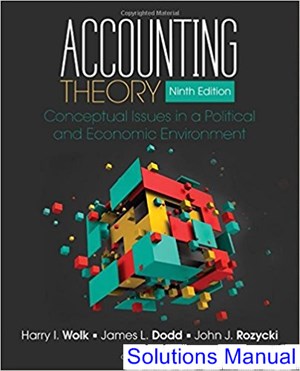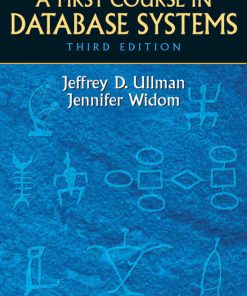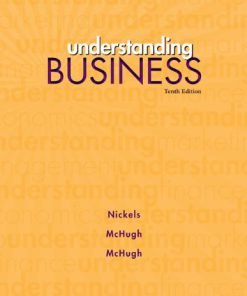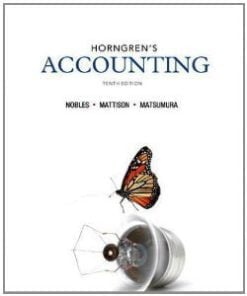Accounting Theory Conceptual Issues in a Political and Economic Environment 9th Edition Wolk Solutions Manual
$35.00 Original price was: $35.00.$26.50Current price is: $26.50.
Accounting Theory Conceptual Issues in a Political and Economic Environment 9th Edition Wolk Solutions Manual
Accounting Theory Conceptual Issues in a Political and Economic Environment 9th Edition Wolk Solutions Manual

Product details:
- ISBN-10 : 9781483375021
- ISBN-13 : 978-1483375021
- Author: Harry I. Wolk, James L. Dodd
This updated Ninth Edition of Accounting Theory: Conceptual Issues in a Political and Economic Environment continues to be one of the most relevant and comprehensive texts on accounting theory. Authors Harry I. Wolk, James L. Dodd, John J. Rozycki provide a critical overview of accounting as a whole as well as touch on the financial issues in economic and political contexts, providing readers with an applied understanding of how current United States accounting standards were derived and where we might be headed in the future. Readers will find learning tools such as questions, cases, problems and writing assignments to solidify their understanding of accounting theory and gain new insights into this evolving field.
Table contents:
Chapter 1: An Introduction to Accounting Theory Accounting Theory and Policy Making The Role of Measurement in Accounting Plan of This Book Appendix 1-A: Valuation SystemsChapter 2: Accounting Theory and Accounting Research Accounting Research and Scientific Method Is Accounting an Art or a Science? Directions in Accounting Research A Scientific Revolution in Accounting?Chapter 3: Development of the Institutional Structure of Financial Accounting Accounting in the United States Prior to 1930 Formative Years, 1930-1946 Postwar Period, 1946-1959 Modern Period, 1959 to the PresentChapter 4: The Economics of Financial Reporting Regulation The Case for Unregulated Markets for Accounting Information The Case for Regulated Markets for Accounting Information Imperfections of Accounting Regulation The Regulatory Process Economic Consequences of Accounting PolicyChapter 5: Postulates, Principles, and Concepts Postulates and Principles Basic Concepts Underlying Historical Costing Equity Theories Appendix 5-A: The Basic Postulates of Accounting (ARS 1) Appendix 5-B: A Tentative Set of Broad Accounting Principles for Business Enterprises (ARS 3)Chapter 6: The Search for Objectives ASOBAT APB Statement 4 The Trueblood Committee Report SATTA User Objectives and User DiversityChapter 7: The FASB’s Conceptual Framework The FASB’s Conceptual Framework The Conceptual Framework as a Codificational Document Empirical Research on the Conceptual Framework Assessing the Conceptual FrameworkChapter 8: Usefulness of Accounting Information to Investors and Creditors Earnings, Dividends, and Stock Prices Residual Income Models Background on Risk and Return Introduction to Capital Markets Research in Accounting The Value of Accounting Information: Evidence From Return Data The Value of Accounting Information: Evidence From Direct Valuation Accounting Data and Creditors Importance of Earnings Forecasting Empirical Research and Standard SettingChapter 9: Uniformity and Disclosure: Some Policy-Making Directions What Underlies the Choice Among Accounting Methods? Uniformity The Usefulness of Accounting Allocations Disclosure Improving Accounting StandardsChapter 10: International Accounting National Accounting Differences International Harmonization of Accounting Standards
People also search:
what are conceptual theories
theory of conceptual change
accounting theory topics
what is conceptual change theory
accounting theory conceptual issues in a political and economic environment
Related products
Solution Manual
Solution Manual for Absolute C++, 5/E 5th Edition Walter Savitch
Solution Manual
Solution Manual
Understanding Business Nickels 10th Edition Solutions Manual
Solution Manual
International Accounting Doupnik 4th Edition Solutions Manual
Solution Manual
Solution Manual











